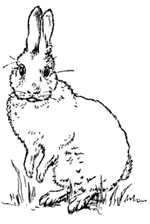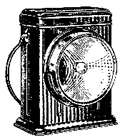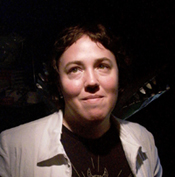Kelly Link, Words by Flashlight June 7, 2006 – Posted in: Free Content, Interviews, Sybil's Garage
Kelly Link, Words by Flashlight
Interview by Lauren McLaughlin
to the sound of Sufjan Steven’s Decatur or Round of Applause for Your Stepmother and Aimee Mann’s Little Bombs and Calexico and Iron & Wine’s A History of Lovers and Yo La Tengo’s The Whole of the Law and Ella Fitzgerald singing Why Was I Born and The Winterpills, and lots of other good stuff…
As published in Sybil’s Garage No. 3
Do you listen to music when you write? What kind of music?
I’ve gotten a little superstitious about listening to music when I write. Once a story is going somewhere, I keep listening to the same music whenever I work on that story. It seems to help me keep in voice, and alternatively, if I need to make some kind of dramatic shift, I’ll go and put on something different to shake myself awake, out of that particular set of rhythms. When I’m starting a story, I try to listen to music that’s going to help evoke a certain emotional space or speed or kind of complexity or spareness or loneliness that I want to access for story reasons. I guess it’s like inviting a story to dinner — you want to seduce that story into doing what you want it to do, and so you have to set the mood with the right music.
Aimee Mann is great for working to. Other favorites — Hem, Rufus Wainwright, Emmylou Harris, Patsy Cline, M. Ward, Magnetic Fields. Those are still my standbys. For a long time I was listening to Summer Teeth, one of Wilco’s CDs. Stupid or too-obvious lyrics drive me insane when I’m working. Mixes with singers and bands like Jenny Toomey, Sufjan Stevens, Postal Service, The Rosebuds, Neko Case, The Decemberists, Yo La Tengo, Mayumi Kojima, lots of others!
For the last year or so, I’ve mostly been writing in cafés, and then I mostly listen to conversations at other tables. I get paranoid when I have my headphones on in public.
When did you decide you wanted to become a writer? Did you ever consider another career, perhaps as a performance skydiver?
I didn’t do anything as active as deciding that I wanted to be a writer. For one thing, I didn’t feel like I was the final authority on whether or not I was anything like a writer. (I’m a timid soul.) I just kept writing stories, because becoming a veterinarian seemed as if it involved too much dissection, too much memorization, too much work. The place that I’ve always felt most at home was in a group of people, or one on one, talking about books or short stories.
After I was already fairly invested in writing short stories, I took a geology course and passionately wished that I was a geologist instead. Library work always seems appealing, and I miss being the new book buyer at Avenue Victor Hugo in Boston. I took a course on writing musicals in college, but dropped out because I couldn’t seem to figure out how to write lyrics that were worth anybody’s time, including my own. Topiary has always seemed like a good occupation, comparable in some ways to writing short fiction. For a long time I took lessons in watercolors, and I loved that — the blotty, sketchy, all-your-sins-right-there-to-look-at aspect of it.
No! Never! I had a noon-to-ten bookstore job, but that didn’t involve wearing pantyhose. Some days I forget to brush my hair. I don’t think I’m cut out for a job where you have to look professionally tidy. I prefer working in my pajamas and taking showers after lunch. And I know how lucky I am.

Early influences were the usual suspects — that is, pretty much everyone who wrote science fiction, fantasy, young adult fiction, short stories, etc, except for Isaac Asimov and Andre Norton. I didn’t read them until it was too late. One of my favorite YA novels, The Borribles, just came back into print. I’m rereading John Collier and Saki and Joan Aiken and Isak Dinesen collections right now, so I guess they’re late influences as well. And I just read a new collection by a writer named Joe Hill — 20th Century Ghosts — which has really gotten stuck in my brain. I’ve been thinking a lot about how Grace Paley and Eudora Welty put stories together.
Zombie movies and Diana Wynne Jones’ novels were both influences on stories in Magic for Beginners.
Is your writing influenced by the reading you did for SciFiction and the Best of… anthologies you edit?
Probably, although I’m not sure I can tell you how. I read voraciously, and there’s almost nothing I’d rather do, and so it’s been disconcerting in both good and bad ways to get paid for doing it. I don’t know if it takes any of the pleasure out of reading, but I do know that worrying about whether it’s taken away some of the pleasure out of reading has taken some of the pleasure out of reading.
And because mysteries, mimetic fiction, and science fiction novels can be considered in no way part of my purview, they’ve become my escape reading. (Although Lorrie Moore just had a short story published in The New Yorker which has a ghost in it — I had to shift gears suddenly, and instead of simply reading the story for the sake of enjoyment, I had to think about it in a new context.)
You mentioned in an interview the desire to write a novel, perhaps one in which people tell stories to each other. Is this still something you would like to do?
Yes, I would like to write a novel, or at least try to write one, although my motives are not entirely pure. For one thing, I get asked about writing novels so much that I feel guilty about never having written one. And although I have no strong desire to write a novel, I would hate not to try. That would just be silly. On the other hand, I hate the idea of slogging through something that turns out to be not good.
One of the most compelling aspects of your stories is their refusal to reduce down to metaphor or allegory. They seem to exist in a universe where the fantastic is mundane and the mundane fantastic. Were you ever tempted or encouraged to mold your vision into something more familiar, something easier to slot into a genre?
I’m fairly stubborn. I’m not easily tempted or encouraged. The thing is, I enjoy reading all sorts of writing. Some of the stuff I like to read is much more experimental than my own work, and some is much more traditional. I just finished reading Naomi Novik’s debut novel, The King’s Dragon, which is a sort of wonderful mash-up of Anne McCaffrey and Patrick O’Brien, and also something much more original, of course, or it wouldn’t stand on its own. It was a blissful reading experience. There are a number of romance writers whose work I genuinely love — Laura London, Georgette Heyer, Laura Kinsale, Eva Ibbotson. I wish I could do that. I wish I could write a novel like Dodie Smith’s I Capture the Castle or Dorothy Dunnett’s Lymond Chronicles. I wish I could write a novel like Bel Canto or Liquor or Air or the People of the Paper. I like conventional narratives as much as I like unconventional narratives.
The thing about the stories I’ve already written is that I wrote them the way it seemed to me that they ought to be written. I don’t wish that they were particularly different, even though I might wish that I’d been a better writer when I tackled them.
I could reduce some of my stories down to their metaphorical or allegorical level, but why bother? I’m interested in things which are confusing or contradictory in a useful or enjoyable way. Even allegories don’t boil down to just one interpretation or meaning. Besides, as far as I can tell, nobody ever reads the same story.
When you’re working on something new, what constitutes the initial spark? Is it a bit of plot? An image? A genre convention you want to explore?
The initial spark usually has something to do with panic — I’m due to turn in a story to a workshop or an editor. It’s a terrible working method.
At the moment, I’m attempting to write at a steadier pace. I’m also aiming for a broader (or maybe I mean deeper) range of character. In terms of style, too, I think I’ve been working with a somewhat limited — although intentionally limited — set of tools. So I’m attempting to be a bit looser as I start stories off. To digress. To make interesting mistakes.
Can you tell me anything about your early publishing career? Did you find it difficult to sell your first stories?
Yes and no. I didn’t send my work out much when I was first writing short stories. I’d sent out two or three stories (the only one I can remember sending out was to the Writers of the Future contest, although I also had this strange ambition to be published in Playboy, even though I’d never bought a copy of the magazine). I got them back again and figured I ought to get better as a writer before I sent more out. One of my instructors in graduate school, Fred Chappell, told me I ought to send a story, “Flying Lessons”, to Ellen Datlow at OMNI. So I did, and I got a very nice rejection back. The next story I sent out was “Water Off a Black Dog’s Back” — I sent it to Century (I’d seen a sample of Century at a World Fantasy convention and liked the typeface) and it was accepted just as I was applying to Clarion.
While I was at Clarion, Asimov’s took “Flying Lessons,” and Shawna McCarthy, who was the visiting editor that summer, asked me to submit two stories — “Vanishing Act” and “The Specialist’s Hat” to Realms of Fantasy. She published “Vanishing Act” and never mentioned “The Specialist’s Hat” again. I think that story just disappeared into the great slush sea that menaces all magazines. After Clarion nothing I sent out sold for about a year, even though I was pretty sure that I was writing more interesting stuff then I had been writing before Clarion. By that point, a friend who worked with me at the same bookstore, Gavin J. Grant, was starting a zine and I asked if I could help. We were just publishing stuff for fun, including work by most of our friends, and I gave him “Travels With the Snow Queen,” which had been bounced a couple of times. The next year Ellen Datlow bought “The Specialist’s Hat” and “The Girl Detective.”
 Do you complete every story you begin or do you abandon some of them as unworkable?
Do you complete every story you begin or do you abandon some of them as unworkable?
I don’t abandon stories once I’ve started working on them. Once I sit down and start a story, I’ll be damned if I’m going to give up on it. But I do reject most of the ideas for stories that I come up with. I’m halfway through a story that I started last spring, and it’s a mess, but I hope to finish it fairly soon. Some stories take years to finish. Other stories I write so fast that my hands cramp up. “The Faery Handbag” was fast — I wrote it in under 48 hours. “Stone Animals” was slow (over a year). “Monster,” which was recently published in the McSweeney’s anthology Noisy Outlaws, was fast. I’m grateful when stories come in a rush, although I keep an eye on them afterwards, to see whether they hold together. It’s harder to judge the ones that took so long to finish. With those, I’ve lost perspective. Mostly I’m just glad that I can be done with them.
You’ve explored a number of science fiction, fantasy, and horror conventions, like zombies, witches and fairies. Are there others you’d like to tackle?
I’d like to write some actual science fiction. Or at least some space opera. I’d really like to write a romance novel. I’ve never managed to find a way to write about Sleeping Beauty or Rapunzel or serial killers or trolls or to use the conventions of sword and sorcery. But I think I’ll always end up wanting to write more ghost stories. I’ll always come back to ghost stories.
What do you think is the role of the small press, in particular the role of magazines like Lady Churchill’s Rosebud Wristlet?
There are a couple of different reasons for people to start zines like LCRW or do small press work. Mostly it’s to publish the work that you love. You’re not going to get rich doing it, so why publish anything that you don’t love? We started LCRW because it seemed like fun to start a zine, and by the time we were working on the third issue, we realized that there were short stories that weren’t quite genre or mainstream, which were difficult for writers to place even though they were wonderful stories. So we started soliciting some of the writers whom I knew had oddball work. We also wanted to showcase promising work by newer writers, to give them a foothold. And we wanted to publish different kinds of work as well, so that the magazine didn’t feel like too much of one kind of good thing.
As a writer who has published herself, it’s been an overwhelmingly positive experience which I don’t recommend, because there are too many ways that it can go badly. But I do think that it’s a good thing for a writer to become familiar with the way that publishing works. It’s good to read slush, to think about book production, to learn how copyeditors and proofreaders work, and to consider the book as a physical object. It’s good to think about marketing and about how bookselling works. You can choose your own level of immersion.
If you could assign genre short story projects to other writers, What would they be? For example: assigning William Gibson to write about selkies.
I would make all my favorite writers write ghost stories. (All the ones who don’t already write ghost stories). But really what I’d like to do is make certain writers read certain other writers. It’s the bookseller’s impulse, coming out strong in me, as usual.
Where do you buy your fab t-shirts?
Online! From Threadless.com and from Gama-Go. I like anything with a squid or a yeti or a movie monster on it.
 It’s a Sybil’s Garage tradition to ask authors what they are listening to right now. So what are you listening to?
It’s a Sybil’s Garage tradition to ask authors what they are listening to right now. So what are you listening to?
A mix CD I made for Karen Meisner. It’s got Sufjan Steven’s “Decatur, or Round of Applause for Your Stepmother” and Aimee Mann’s “Little Bombs” and Calexico and Iron & Wine’s “A History of Lovers” and Yo La Tengo’s “The Whole of the Law” and Ella Fitzgerald singing “Why Was I Born” and The Winterpills. Lots of other good stuff. More importantly, it’s snowing! I’m in a cabin out in the woods, and later tonight I will have to make my way back out again by flashlight. Wish I had a sled.


